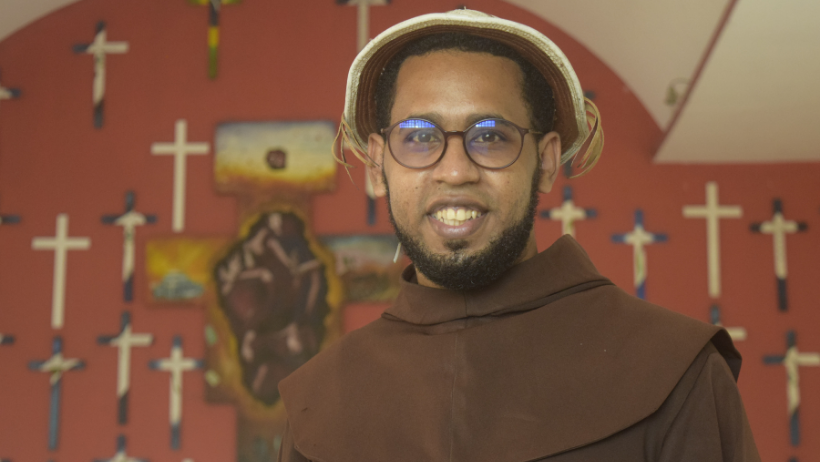We had the pleasure of interviewing him to find out more about him and what motivated him to volunteer at the shelter
Br. Flavio Lorrane Clementino de Almeida, from the region of Pernambuco, in the north-east of Brazil, arrived at La 72, Home – Refuge for Migrants, on the 31st of January. Br. Lorrane, 28 years old, is in the process of formation as a Franciscan in the Franciscan Province of St. Anthony in Brazil. Last December, he graduated in Theology, with research on communication as an instrument of care for the common home, Laudato Si’. He also worked with homeless people, social movements, migrants and the LGBTI community. For some time now, he has accompanied the Migrant Pastoral Ministry of the Archdiocese of Fortaleza, Brazil.
A member of the JPIC Commission of his Province, he arrived in Tenosique for his year of Franciscan experience in La 72. Here is an extract of the conversation we had with Br. Lorrane.
Why were you interested in coming to La 72?
The first time I got to know La 72 was in a report four years ago, on the JPIC website, about the work that is done here, especially for the LGBTI community in Tenosique, and that it is one of the first shelters in Mexico to welcome people from the community. Then, on the website of La 72, in 2018, with the RFM, I found out more about La 72 and that it had more activities.
You mentioned that you worked with migrants and the LGBTI community. How did you do this?
Through social networks. In the Province, I worked in Communication with the Santo Antônio Web Radio, and I was a member of JPIC Media. That’s why I want to study Journalism, I would like to return to Brazil at the end of the volunteering and start my studies, but it could be in another place.
La 72 comprises different areas: Humanitarian Assistance, Human Rights, Structural Change, Vulnerable Groups, and now the Communication area has been launched. From what you mentioned, your previous knowledge would be of great help to us in managing the new area. Although I have to ask, would you like to volunteer there, or are you open to any other?
I am open to the various opportunities, but communication is better because it is an area I have already worked in, and I know about it. I would like to create simple communication in the networks so that people from outside, the followers, understand how La 72 works and become volunteers one day. I have experience in my Province where our goal is to show our work. In La 72, it is different; I need to adapt and know the needs of the house to contribute as much as possible.
Now that you are a volunteer at La 72, how do you feel?
It’s all different because, as a friar, I have a different life. I already have an established routine, and now I have to devote myself to the care of migrants. So I came to help in any way I could, both as a friar and as a volunteer.
I feel good; it’s the first time I’ve left my country, and I’m in the process of adaptation. Now I don’t have much to do because I’m arriving, so I want to be involved and have specific activities. I have already spoken to some fellow migrants who speak Portuguese, my language.
What are your expectations of being at La 72, or what do you hope to take away?
I hope to return more human and also take the opportunity to learn to speak Spanish. To get to know a new culture, that which encompasses everything, to start eating differently. I hope that this life experience will be helpful for my mission as a friar in Brazil. Before I had worked indirectly with migrants through the Migrant Pastoral Ministry that meets in our friary, our house, I had the opportunity to be with our migrant and refugee brothers and sisters. In Fortaleza, there is a migrant house, there are many Venezuelans, but it is not ours; it belongs to the Archdiocese.
If you want to know more about the volunteering process in some of the Houses or Teams attached to the Franciscan Network for Migrants, you can visit our dedicated website: www.franciscannetwork.org


